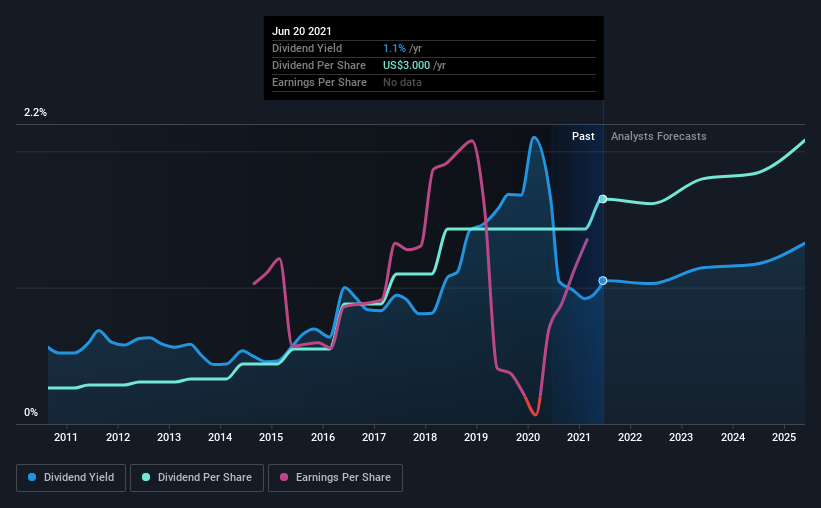FedEx (NYSE:FDX) Could Be A Buy For Its Upcoming Dividend
Readers hoping to buy FedEx Corporation (NYSE:FDX) for its dividend will need to make their move shortly, as the stock is about to trade ex-dividend. The ex-dividend date is one business day before the record date, which is the cut-off date for shareholders to be present on the company's books to be eligible for a dividend payment. The ex-dividend date is an important date to be aware of as any purchase of the stock made on or after this date might mean a late settlement that doesn't show on the record date. Meaning, you will need to purchase FedEx's shares before the 25th of June to receive the dividend, which will be paid on the 12th of July.
The company's next dividend payment will be US$0.75 per share. Last year, in total, the company distributed US$2.60 to shareholders. Looking at the last 12 months of distributions, FedEx has a trailing yield of approximately 1.1% on its current stock price of $285.32. We love seeing companies pay a dividend, but it's also important to be sure that laying the golden eggs isn't going to kill our golden goose! So we need to check whether the dividend payments are covered, and if earnings are growing.
View our latest analysis for FedEx
If a company pays out more in dividends than it earned, then the dividend might become unsustainable - hardly an ideal situation. FedEx has a low and conservative payout ratio of just 23% of its income after tax. Yet cash flows are even more important than profits for assessing a dividend, so we need to see if the company generated enough cash to pay its distribution. Luckily it paid out just 18% of its free cash flow last year.
It's positive to see that FedEx's dividend is covered by both profits and cash flow, since this is generally a sign that the dividend is sustainable, and a lower payout ratio usually suggests a greater margin of safety before the dividend gets cut.
Click here to see the company's payout ratio, plus analyst estimates of its future dividends.
Have Earnings And Dividends Been Growing?
Companies with consistently growing earnings per share generally make the best dividend stocks, as they usually find it easier to grow dividends per share. If earnings decline and the company is forced to cut its dividend, investors could watch the value of their investment go up in smoke. That's why it's comforting to see FedEx's earnings have been skyrocketing, up 25% per annum for the past five years. With earnings per share growing rapidly and the company sensibly reinvesting almost all of its profits within the business, FedEx looks like a promising growth company.
Another key way to measure a company's dividend prospects is by measuring its historical rate of dividend growth. In the past 10 years, FedEx has increased its dividend at approximately 20% a year on average. It's great to see earnings per share growing rapidly over several years, and dividends per share growing right along with it.
Final Takeaway
Has FedEx got what it takes to maintain its dividend payments? We love that FedEx is growing earnings per share while simultaneously paying out a low percentage of both its earnings and cash flow. These characteristics suggest the company is reinvesting in growing its business, while the conservative payout ratio also implies a reduced risk of the dividend being cut in the future. It's a promising combination that should mark this company worthy of closer attention.
So while FedEx looks good from a dividend perspective, it's always worthwhile being up to date with the risks involved in this stock. For example, we've found 2 warning signs for FedEx that we recommend you consider before investing in the business.
We wouldn't recommend just buying the first dividend stock you see, though. Here's a list of interesting dividend stocks with a greater than 2% yield and an upcoming dividend.
This article by Simply Wall St is general in nature. It does not constitute a recommendation to buy or sell any stock, and does not take account of your objectives, or your financial situation. We aim to bring you long-term focused analysis driven by fundamental data. Note that our analysis may not factor in the latest price-sensitive company announcements or qualitative material. Simply Wall St has no position in any stocks mentioned.
Have feedback on this article? Concerned about the content? Get in touch with us directly. Alternatively, email editorial-team (at) simplywallst.com.


